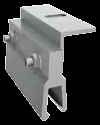Solar Energy Systems Bellingham Corrugated Roof Clamp
- Loading Port:
- China Main Port
- Payment Terms:
- TT OR LC
- Min Order Qty:
- -
- Supply Capability:
- -
OKorder Service Pledge
OKorder Financial Service
You Might Also Like
Versolsolar providing all those widely used clamps for different installation solutions.
We have test installation of all clamps in our factory to ensure it’ll save your time and labor cost.
Clamps made by Aluminum alloy or stainless steel with highly stability and a perfect fixation on the roof.
Choose the suitable clamp for the corresponding roof as showed in the following table.
With triangular supporting frames, it's possible that modules will be installed with a certain angle to optimize the power of sunshine. Versolsolar offers triangular supporting frames in aluminum or galvanized steel. For Customized Size and Installation Angle
- Q: Can solar energy systems be used for charging mobile devices?
- Yes, solar energy systems can be used for charging mobile devices. Solar panels can convert sunlight into electricity, which can then be used to charge mobile devices through a compatible charger or power bank. This provides a sustainable and environmentally friendly way to charge mobile devices, especially in remote areas or during power outages.
- Q: Can solar energy systems be used in powering printing presses or publishing houses?
- Printing presses and publishing houses can be powered using solar energy systems. Solar panels can harness the renewable and sustainable power of the sun and convert it into electricity. This electricity can then be used to operate various equipment found in publishing houses, including printing presses, computers, and machinery. By installing solar panels on the rooftops of these facilities, a significant amount of electricity can be generated. This reduces the need for traditional energy sources and lowers utility costs. The size of the solar energy system required will depend on the specific energy demand of the facility, but it is entirely feasible to power printing presses and publishing houses with solar energy. Solar energy systems also provide a reliable and consistent source of power, as long as there is sufficient sunlight available. This is especially advantageous in regions with abundant sunlight, as the facilities can potentially become self-sufficient in terms of electricity generation. Furthermore, utilizing solar energy systems for powering printing presses and publishing houses has environmental benefits. Solar power is a clean energy source that produces no greenhouse gas emissions or air pollution during operation. By switching to solar energy, these facilities can significantly reduce their carbon footprint and contribute to a more sustainable future. In conclusion, solar energy systems offer a renewable, sustainable, and environmentally friendly alternative for powering printing presses and publishing houses. They provide the potential for cost savings, energy independence, and a reduced carbon footprint.
- Q: How does the angle and orientation of solar panels affect energy production?
- The efficiency and energy production of a solar system are significantly influenced by the angle and orientation of solar panels. The angle, also referred to as the tilt angle, indicates the degree of tilt relative to the horizontal plane. The orientation, on the other hand, indicates the direction the panels face, which can either be towards the sun or towards a fixed direction like south. To begin with, the amount of sunlight that reaches the panels is affected by their angle. The optimal tilt angle varies depending on the location's latitude. Generally, a tilt angle equivalent to the latitude of the area is considered ideal for maximizing energy production. This angle allows the panels to receive the most direct sunlight all year round, taking into account the seasonal changes in the sun's position. If the panels are tilted significantly away from the optimal angle, they will receive less sunlight, resulting in reduced energy production. Moreover, the orientation of the solar panels is crucial for maximizing energy production. Ideally, the panels should face the direction that receives the most sunlight throughout the day. In the northern hemisphere, this is typically towards the south, while in the southern hemisphere, it is towards the north. This alignment ensures that the panels capture the maximum amount of sunlight as the sun traverses the sky. If the panels face a different direction, like east or west, they will receive sunlight for a shorter duration during the day, leading to lower energy production. Furthermore, the angle and orientation of solar panels impact the incidence angle of sunlight. The incidence angle refers to the angle at which sunlight strikes the panels' surface. Ideally, sunlight should hit the panels perpendicularly to maximize energy absorption. When the incidence angle deviates from 90 degrees, the sunlight is dispersed over a larger surface area, reducing energy conversion efficiency. By optimizing the tilt angle and orientation, solar panels can be positioned to minimize the incidence angle and maximize energy production. In conclusion, the angle and orientation of solar panels are crucial factors in determining energy production. By tilting the panels at the optimal angle and aligning them towards the direction with the most sunlight, solar systems can maximize energy capture and conversion. This ensures that solar panels operate at peak efficiency and generate the highest possible amount of energy.
- Q: What is the role of solar energy systems in reducing reliance on fossil fuels?
- Solar energy systems play a crucial role in reducing reliance on fossil fuels by harnessing the power of the sun to generate clean and renewable electricity. By providing a sustainable alternative to fossil fuel-based energy sources, solar energy systems help to decrease greenhouse gas emissions and combat climate change. Additionally, solar energy systems offer a decentralized and distributed energy generation model, empowering individuals and communities to become energy self-sufficient and less reliant on centralized fossil fuel power plants.
- Q: Can solar energy be used in cloudy climates?
- Yes, solar energy can still be used in cloudy climates, although the efficiency may be reduced. Solar panels can still generate electricity even with limited sunlight, although the output will be lower compared to sunny conditions. Additionally, advancements in solar technology and the use of tracking systems can help optimize energy production in cloudy environments.
- Q: How do solar energy systems affect water quality?
- Solar energy systems do not directly affect water quality as they do not release any pollutants or contaminants. However, the manufacturing and disposal of solar panels may have some environmental impact, including the potential for water pollution if not managed properly.
- Q: Can solar panels be installed on agricultural land without affecting crop production?
- Yes, solar panels can be installed on agricultural land without significantly affecting crop production. By utilizing techniques such as elevated panel mounting, rotational grazing, and optimizing panel spacing, farmers can ensure that solar panels are installed in a way that minimizes shading and allows crops to receive adequate sunlight. Additionally, solar panels can provide dual-use benefits by creating shaded environments that can benefit certain crops, reducing water evaporation and weed growth. Proper planning and design, along with open communication between solar developers and farmers, can help ensure that solar installations and agricultural activities can coexist harmoniously.
- Q: Can solar energy systems be used in powering agricultural processing facilities?
- Yes, solar energy systems can be used to power agricultural processing facilities. Solar panels can be installed on the rooftops or surrounding land of these facilities to generate electricity. This renewable energy source can provide a reliable and cost-effective solution to meet the power requirements of various agricultural processing operations, such as drying, milling, refrigeration, and packaging. Additionally, solar energy systems can help reduce greenhouse gas emissions and dependence on fossil fuels, making them an environmentally sustainable choice for powering agricultural processing facilities.
- Q: Can a solar energy system be installed on a warehouse or industrial facility?
- Certainly, it is possible to install a solar energy system on a warehouse or industrial facility. In fact, these types of structures are often ideal for solar installations due to their expansive roof areas and abundant exposure to sunlight. The installation of solar panels on a warehouse or industrial facility can assist in reducing energy expenses, reducing dependency on grid electricity, and contributing to a more sustainable and environmentally conscious operation. Moreover, solar energy systems can serve as a backup power source in the event of grid failures, ensuring uninterrupted operations in crucial industrial processes. With the advancements in solar technology and the availability of various financing options, the installation of solar energy systems on warehouses and industrial facilities has become increasingly practical and cost-efficient.
- Q: Do solar energy systems require maintenance?
- Yes, solar energy systems do require maintenance. Regular inspections, cleaning of solar panels, and occasional repairs or replacements of components may be necessary to ensure optimal performance and longevity of the system.
Send your message to us
Solar Energy Systems Bellingham Corrugated Roof Clamp
- Loading Port:
- China Main Port
- Payment Terms:
- TT OR LC
- Min Order Qty:
- -
- Supply Capability:
- -
OKorder Service Pledge
OKorder Financial Service
Similar products
Hot products
Hot Searches
Related keywords


















